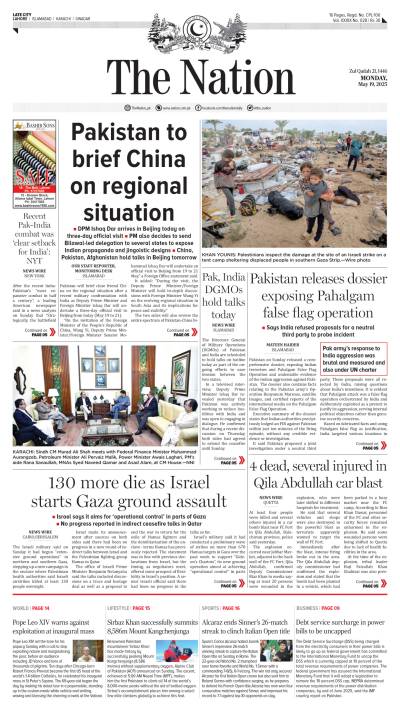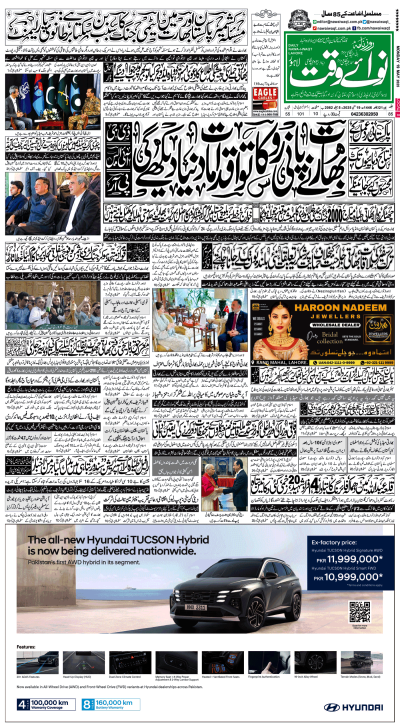US owes Pakistan Rs. 18 million over use of Pakistani airbases. Whether Pakistan will receive the amount is not the striking part of the equation, but rather will Pakistan continue its policy to apprehend her status as a major US ally against terrorist networks. US President Barack Obama recently remarked that instability will continue for decades in Pakistan, to which Tareq Aziz responded: "Pakistan's answer to instability is the strengthening democracy in the country."
Democracy is the best revenge. Pakistan has faced challenges persistently from the episodes of military interventions to weak democracies being restored. The nation-state of Pakistan in the throes of birth realised that it had dearth of resources to build a new federation. Era of 1950s and 60s proved to be promising as people of Pakistan ventured into experiments and as a young nation found itself on path of self determination. Reaching new heights in progress and development, it was a time when Pakistan exported her talent and knowledge as trendsetters in aviation, agriculture and tourism. With two wars against hostile eastern neighbour and a vulnerable western border, the national mindset shifted towards India-centrism and we became drawn to predicaments of our failures instead of renewing our pledge to a Pakistan that was meant to be a cohesive nest of people from different backgrounds. What was witnessed after that was our security and foreign policy fall into the hands of a military-industrial complex which was a case of uninterrupted and unchallenged policy-making as it fell into hand of few decision-makers and thus, Pakistan developed credentials of a 'warrior state'.
The status quo has remained unchanged as civilian governments could never endorse a strong power grip on state institutions. Two wrongs can never make a right. Pakistan harboured madrassa culture and sought to establish an Islamic Republic in modern era. Drafting the constitution seemed a herculean task. Progressive Islamic values were unheard of as patriotism and religion proved to be opium for the masses who passively came to regard accountability as an issue that was separate from authority. Army seems like an institution that is a 'holy cow' and is solely responsible for the welfare of state even in a democratic rule of government. This status quo has never changed as we have travelled from 'single plane to planes of dimension' – Zia's Islamization to Musharraf's enlightened moderation – under army rule. Regardless of the truth that all army operations have been carried out under civilian regimes; the general elections of 2013 invited criticism from the second-largest party, PTI, who claimed that rigging had altered the election results and status quo was preserved through organised means.
Babar Fateh Yaqub, Secretary of ECP, left for India on January 22nd. The agenda has been kept confidential. One ECP official said that the purpose of visit was aimed at learning from the Indian model of Electoral Laws. This development came at a time when Supreme Court announced decisions on Aleem Dar's petition and Khawaja Saad Rafiq's case. It seems that the Supreme Court has also suffered serious strokes from the unfinished lawyers revolution and weak development of legal framework. There is nothing wrong in learning something good by following rules and experiences of others as long as it will benefit electoral procedures in Pakistan. The Supreme Court should, however, focus on the utmost ignorance of the Council of Islamic Ideology (CII) instead of approving laws for hunting of Houbara Bustard, a rare breed near extinction. Imran Khan has contested general elections to highlight matters of social utility. Shaukat Khanum Peshawar, NAMAL University and KPK Police reforms are projects that do provide certain levels of social utility. Ensuring transparent elections is a right every Pakistani citizen should be granted. Nevertheless, a political solution is necessary with a judicial injunction propagated through proper legal reforms. Kazim Ali Shah's decision on Ayaz Sadiq's case was a decisive nay to the doctrine of necessity. However, consideration of the fact that law followed in Pakistan has not functioned to the core as the third pillar of state has led the lawyers like Aitezaz Ahsan, Hamid Khan, Asma Jehangir etc to distance themselves from the impending struggle of lawyers’ movement. The grass root of a progressive society is in establishing its link with evolutionary mechanisms. Israel, Great Britain and New Zealand are three countries who have common law i.e. they do not have a written law. It is open to interpretation.
When we take into account the factor of Pakistani law and the law-making institutions, a pattern evolves where the changes in status quo are over the time, ineffective and partial. Retired Chief Justice Dogar's case in relation to Musharraf treason trial has been received with a low key. In order to ensure that the judiciary works effectively, the enforcer executive and the law-maker parliament should follow a path of self-accountability. This comes through genuine democracy. 'Bloody' civilians should move a step ahead of social utility projects. This involves educating people about the dynamics on the ground and the controversial social issues like Mumtaz Qadri, Good/Bad Taliban, sectarianism, secularism and liberalism in our conservative society. Civil religion is limited to Constitution with no basis of enhancing concept of Jinnah's nation-state. The objective resolution and 1956 Constitution were improvised but the general rules of accountability were never implemented. Constitutionalism is "a complex of ideas, attitudes, and patterns of behavior elaborating the principle that the authority of government derives from and is limited by a body of fundamental law.''
Equal education for all would lead to 'self-reliability' – a path to the self determination that was lost between militaristic adventures and politics of the 90s. Saying No to Saudis during Yemen Invasion 2015 was a head start for Pakistan to shift from security-driven to progress-driven policy. Chief Justice Anwar Zaheer Jamli addressed the Senate, which was an unprecedented move by any Chief Justice of Pakistan. For the first time, civilian-military technocrats and bureacrats have unanimously called for a practical solution to the religious and mationalist militancy i.e. campaign for 'fencing the border' and impartial targeting of anti-state elements which is reflected through Jibran Nasir's independent struggle against Maulana Abdul Aziz and his likes who threaten the writ of state. Democratic transition ensures that we do not make mistakes that weaken the pillars of state. Army is the largest conglomerate in the country. Kayanis' DHA scams along with Arsalan Iftikhar case would never have been subjected to court proceedings meanwhile ex-CJ Iftikhar Chaudhry seeks to form a new party. Not to forget the looming scenario of Deobandi madrassas that belittle state intervention through their misguided conduct. Democracy leads to inculcation of democratic and liberal ideas that provide a secular outlook in a nation-state like Pakistan where theocracy is not the form of government.
The challenges that Pakistan faces can be surmounted through a positive outlook towards the system. The system comprises of the three pillars of the state and a working relationship between national institutions as per the socio-economic and political dynamics of the provinces. National Action Plan is a survival and self-correcting mechanism. The youth of Pakistan represent 60 percent of the total population. The best factor in changing the status quo is the utilisation of the potential that the youth can offer to the motherland. Pakistan needs to ensure that the democratic government completes its tenure to fulfill the national aspirations. Pakistani people need to put faith in themselves. They have survived numerous challenges. The best thing about Pakistanis, I would say, is also the worst thing about Pakistanis i.e. the factors that run their mentality are none! They have never accepted rulers who compromise their freedom for a long period of time, be it in the form of dictators or civilian rulers. Banishing the role of slavish mentality that was purported through the implementation of dictatorial policies, they are now prepared and seek awareness on how to adopt a liberal and democratic outlook – for Pakistan was never a theocracy. Jinnah referred to Pakistan as a sovereign state that recognized the sovereignty of Allah. Any steps on this path and towards goal of democratic, Islamic republic would work as a ladder that leads to enhancing and ensuring the sovereignty of nation-state of Pakistan, which lies at the crossroad of the world. The more we learn, the less it will be. Hence, the status quo will never remain the same over the years.
Pakistani leadership should focus on inclusive ways to establish ground for the people of Pakistan to contribute to the welfare of state. Governance should have checks and balances, specifically, regarding decision-making. Institutional development will occur through proper channelisation of human resource on basis of merit. The structure of government always is an important, vital factor in determining the status of a country for whether it will follow a 'Westphalian' path for in contemporary times; the regional dynamics are factors that are increasingly shaping the decision-making approaches of nation-state. Nuclear Pakistan has followed a path to reformation through 90s and for last 15 years, too. It is time to project national interests on the platform of regional and international level through mechanisms of production and development. This would require Pakistan to implement a program of refurbishing, revamping, relinquishing, reforming and reproducing a 'power structure' that allows entrepreneurial structure of 'governance'. A sovereign Pakistan should utilise the potential available through proper representation of collective will.






